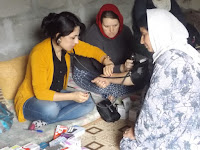 We have now done three days of medical clinics in the camps,
accompanied by Doctor Nian. She is a
young doctor, just past her residency, and has a great manner with the mostly
women and children we are seeing. On
Thursday evening, after seeing 60+ patients in about 2 hours, she gave us a
tour of the newest hospital in Soran. It
is only two years old and really amazing, especially coming from Tanzania; she
also invited us to her dorm room-sized apartment at the hospital. Then yesterday, after spending almost three
hours in a camp, she and her cousin cooked a dinner of Kurdish food for our
entire team and another team that arrived Thursday night. All told, they fed 24 people! Somehow I completely forgot to take photos of
dinner, but it was delicious, and I carried home a plate of layered dessert
composed of--no joke--cookies, vanilla pudding, strawberry jello and banana
slices...not a traditional
Kurdish dish! Dr. Nian is fast becoming a friend, and is someone I feel honored to serve alongside.
We have now done three days of medical clinics in the camps,
accompanied by Doctor Nian. She is a
young doctor, just past her residency, and has a great manner with the mostly
women and children we are seeing. On
Thursday evening, after seeing 60+ patients in about 2 hours, she gave us a
tour of the newest hospital in Soran. It
is only two years old and really amazing, especially coming from Tanzania; she
also invited us to her dorm room-sized apartment at the hospital. Then yesterday, after spending almost three
hours in a camp, she and her cousin cooked a dinner of Kurdish food for our
entire team and another team that arrived Thursday night. All told, they fed 24 people! Somehow I completely forgot to take photos of
dinner, but it was delicious, and I carried home a plate of layered dessert
composed of--no joke--cookies, vanilla pudding, strawberry jello and banana
slices...not a traditional
Kurdish dish! Dr. Nian is fast becoming a friend, and is someone I feel honored to serve alongside. At the camp we went to Friday morning, there were two
pregnant women. One is only two or maybe
three months along, but this beautiful woman is 8+ months with her fifth child. She very graciously allowed me to palpate her
abdomen. I’m still learning how to tell
the position of the baby this way, but it was really an honor to be allowed to touch her and interact with
her in this way. After clinic was over, we
drank tea with the older ladies and a few young ones who floated in and out,
and Dr. Nian translated my questions about pregnancy and birth culture for
Yezidi women. I learned that most of the
children under age 12 were born in hospitals, but that they used to deliver all
their children at home with a few designated older women. They said that sometimes mothers died during
that time from post-partum hemorrhage or retained placenta. When they fled from Sinjar Mountain a year
and half ago, several women in their community were pregnant and delivered at
different points in the long journey from their home to the camp outside of
Soran where they now live. They told me
that as they were traveling, they saw a woman who was trying to reach Turkey
deliver twin boys on the side of the road and she “left them by the sea.”
At the camp we went to Friday morning, there were two
pregnant women. One is only two or maybe
three months along, but this beautiful woman is 8+ months with her fifth child. She very graciously allowed me to palpate her
abdomen. I’m still learning how to tell
the position of the baby this way, but it was really an honor to be allowed to touch her and interact with
her in this way. After clinic was over, we
drank tea with the older ladies and a few young ones who floated in and out,
and Dr. Nian translated my questions about pregnancy and birth culture for
Yezidi women. I learned that most of the
children under age 12 were born in hospitals, but that they used to deliver all
their children at home with a few designated older women. They said that sometimes mothers died during
that time from post-partum hemorrhage or retained placenta. When they fled from Sinjar Mountain a year
and half ago, several women in their community were pregnant and delivered at
different points in the long journey from their home to the camp outside of
Soran where they now live. They told me
that as they were traveling, they saw a woman who was trying to reach Turkey
deliver twin boys on the side of the road and she “left them by the sea.”
The elders at all of the camps have agreed for me to come
and teach their women about maternal health next week, and perhaps I’ll also
get to hear more individual stories from them.
I hope to hear what they have experienced and share some of that with
all of you. It can be healing to tell
one’s story and have it matter to people, so if I can be a vehicle or vessel
for some of that healing, it would be an honor.
I’m just past the halfway mark of this trip, and feeling
pretty strong. Thanks for your prayers
and for following these stories.



3 comments:
Thanks for sharing Leisha
You continue to bless those around you. Much love, Mom and Dad
Leisha, I'm grateful that you are sharing your experiences with those of us reading along, wherever we are. From my bedroom here in Portland, I'm saying prayers for strength for you and your family during the rest of your time in the Middle East. Sending love!
Post a Comment